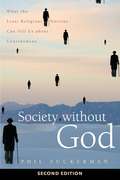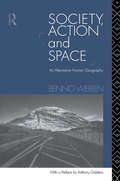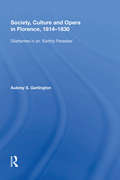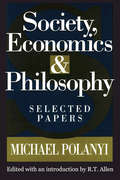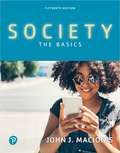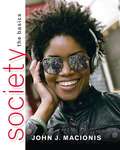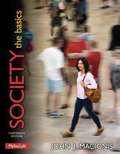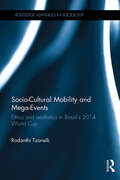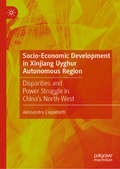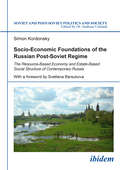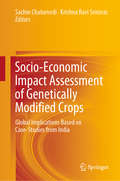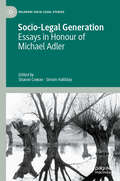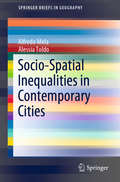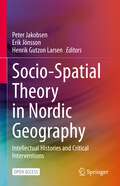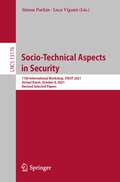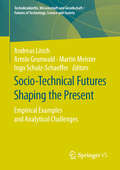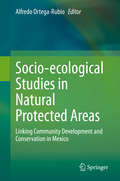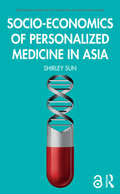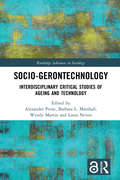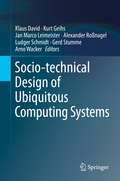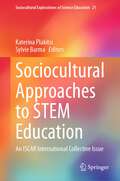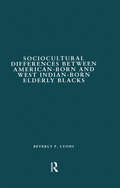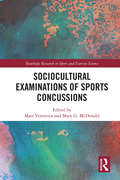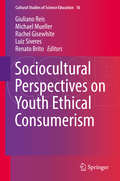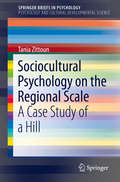- Table View
- List View
Society without God, Second Edition: What the Least Religious Nations Can Tell Us about Contentment
by Phil ZuckermanAn updated edition showcasing the social health of the least religious nations in the worldReligious conservatives around the world often claim that a society without a strong foundation of faith would necessarily be an immoral one, bereft of ethics, values, and meaning. Indeed, the Christian Right in the United States has argued that a society without God would be hell on earth.In Society without God, Second Edition sociologist Phil Zuckerman challenges these claims. Drawing on fieldwork and interviews with more than 150 citizens of Denmark and Sweden, among the least religious countries in the world, he shows that, far from being inhumane, crime-infested, and dysfunctional, highly secular societies are healthier, safer, greener, less violent, and more democratic and egalitarian than highly religious ones.Society without God provides a rich portrait of life in a secular society, exploring how a culture without faith copes with death, grapples with the meaning of life, and remains content through everyday ups and downs. This updated edition incorporates new data from recent studies, updated statistics, and a revised Introduction, as well as framing around the now more highly developed field of secular studies. It addresses the dramatic surge of irreligion in the United States and the rise of the “nones,” and adds data on societal health in specific US states, along with fascinating context regarding which are the most religious and which the most secular.
Society, Action and Space
by Benno WerlenThis is the first English translation of a book which has been widely recognized in Europe as a major contribution to the interface between geography and social theory. Ambitious, crackling with original ideas and persuasively argued, it raises exciting new implications for the study of space and social theory.
Society, Culture and Opera in Florence, 1814-1830: Dilettantes in an "Earthly Paradise"
by Aubrey S. GarlingtonFollowing the defeat of Napoleon in 1814, an event that signalled an end to nearly fourteen years of French domination, Florence seemed to enter a new cultural 'golden age' and by 1824 was described as 'an Earthly Paradise' by the political and liberal writer, Pietro Giordano. Politically, economically and culturally, the city prospered in this new era. After 1814 it seemed as if the Enlightenment had found a new beginning in Florence. Aubrey Garlington, a scholar of long standing in the music of early nineteenth-century Florence, considers the roles played by John Fane, Lord Burghersh, an English aristocrat, diplomat and dilettante composer together with his wife, Priscilla, in the development of the richly homogeneous culture that blossomed in Florence at this time. Burghersh, known today for being instrumental in the founding of the English Royal Academy of Music, composed six operas that were performed privately on numerous occasions at the English Embassy, his best known work being "La Fedra". Lady Burghersh became known for her painting and dilettante theatrical performances. Garlington provides a thorough re-examination of the categories 'professional' and 'dilettante' which were so important in the concept of music at this time. The notions of boundaries between public and private activity are discussed, and the operas themselves are examined specifically. Through the contemplation of the Burghershs's sixteen year stay in Florence, the significance of dilettante orientations are demonstrated to have been essential components for the city's musical and social life. Garlington draws together an impressive compilation of documentation regarding the part music played in shaping society and culture. In this way, the book will appeal not only to opera historians, musicologists and critics working on the nineteenth century, but also to historians and scholars of cultural theory.
Society, Economics, and Philosophy: Selected Papers
by Michael PolanyiSociety, Economics and Philosophy represents the full range of Polanyi's interests outside of his scientific work: economics, politics, society, philosophy of science, religion and positivist obstacles to it, and art. Polanyi's principal ideas are contained in three essays: on the scientific revolution, the creative imagination and the mind-body relation. Precisely because of Polanyi's work in the physical sciences, his writings have a unique dimension not found in other advocates of the market and too infrequently found even in philosophers of science.Polanyi was a powerful critic of totalitarianism and of the deficiencies of the usual defenses of freedom which helped to prepare the way for it. Freedom, he argued, can be based only upon truth and dedication to transcendent ideals, not upon skepticism, utilitarianism and the liberty of doing merely as one pleases. At a time when easy slogans about socialism were dominant in intellectual circles, epitomized by Sidney and Beatrice Webb, and when calls for the central planning of scientific research were made by such as J.D. Bernal, Polanyi exposed their errors and showed that science can flourish only in a free society.More radically than even von Mises and Hayek, Polanyi showed that an industrial economy can operate only polycentrically, that central planning is logically impossible, and that what was called by that name in the Soviet Union was in reality no such thing. Likewise, scientific research can proceed, not by a central plan, but only by the spontaneous self-adjustment of separate initiatives to discover a common reality. Against the positivism dominant within philosophy of science, he argued that the notion of reality must be restored and made central. Yet physical sciences, he also argued, are only one branch of science, and the sciences of life and mind are logically richer and more complex and cannot be reduced to the former, nor mind to body or to computers, nor art to its ph
Society: The Basics
by David Myers Jean TwengeConnecting Social Psychology to the world around us. Social Psychology introduces students to the science of us: our thoughts, feelings, and behaviors in a changing world. Students learn to think critically about everyday behaviors and gain an appreciation for the world around us, regardless of background or major. In this edition, esteemed author David Myers is again joined by respected psychology professor and generational differences researcher Jean Twenge, in presenting an integrated learning program designed for today's students.
Society: The Basics (11th Edition)
by John J. MacionisSociety: The Basics is designed to help students view their everyday lives through a sociological lens. With a strong theoretical framework and a global perspective, Society offers students an accessible and relevant introduction to sociology. In Society: The Basics, Eleventh Edition, John J. Macionis shares his enthusiasm and teaching experience with a clear and engaging approach.
Society: The Basics (Thirteenth Edition)
by John J. MacionisWith a complete theoretical framework and a global perspective, Society: The Basics, 13/e offers students an accessible and relevant introduction to sociology. John Macionis, author of the best-selling Introductory Sociology franchise over the last three decades, empowers students to see the world around them through a sociological lens, helping them to better understand their own lives. This informative, engaging, and entertaining title will change the way readers see the world and open the door to many new opportunities. MySocLab is an integral part of the Macionis learning program. Engaging activities and assessments provide a teaching a learning system that helps students see the world through a sociological lens. With MySocLab, students can develop critical thinking skills through writing, explore real-world data through the new Social Explorer, and watch the latest entries in the Core Concept Video Series. Society: The Basics, Thirteenth Edition is also available via REVEL(tm), an immersive learning experience designed for the way today's students read, think, and learn. Learn more.
Socio-Cultural Mobility and Mega-Events: Ethics and Aesthetics in Brazil’s 2014 World Cup (Routledge Advances in Sociology)
by Rodanthi TzanelliIn June 2014, Brazil opened the twentieth FIFA World Cup with a spectacular ceremony. Hosting the World Cup was a strategic developmental priority for Brazil: mega-events such as these allow the country to be ranked amongst the world’s political and economic leaders, and are supposed to propel the country to its own unique modernity. But alongside the increased media attention and publicity, came accusations of governmental ‘corruption’ and overspending. In Socio-Cultural Mobility and Mega-Events, Tzanelli uses Brazil’s 2014 World Cup to explore how mega-events articulate socio-cultural problems. Critically examining the aesthetics and ethics of mobilities in the mega-event, this book explores these socio-cultural issues and controversies: the background of staging mega-events, including the bidding process and the host’s expectations for returns; ceremonial staging and communications between artistic representations and national symbolism; the clear reaction mega-events almost always generate in national, regional and global activist circles, including accusations of overspending and human rights violations. This interdisciplinary study will appeal to scholars and students of the sociology of mobility, sociology of globalisation, cultural sociology, social and anthropological theory, as well as the sociology of sport, human and cultural geography, and leisure and tourism studies.
Socio-Economic Development in Xinjiang Uyghur Autonomous Region: Disparities and Power Struggle in China’s North-West
by Alessandra CappellettiIn an unprecedented exploration of space and power in rural Xinjiang, a Chinese region home to the Muslim population of the Uyghurs, this book adopts a grounded theory approach and a trans-ethnic perspective into the complex and sensitive topic of land issues and agricultural land evictions in Xinjiang Uyghur Autonomous Region. By exposing the dynamics of land acquisition and power building in the politically contested space of the region, the author shows how state owned land in a key commercial and cultural hub on the new Silk Road became a commodity, in a context of violent human interactions driven by power. Relying on previously undisclosed material and on a unique field research among farmers and local authorities, the author retraces the steps of Uyghur peasant workers, entangled in a suspended situation between abandoned rural villages, migration and urban alienation, in a book which explores agency in violent processes of social change, and adds concepts and insights to the current knowledge of how we become modern citizens. The microcosm of Kashgar, an oasis-city in Xinjiang, acts as a mirror reflecting socio political dynamics framing people’s identity. Shedding light on one of the most inaccessible region in China, this book is a key read for academics and a broader public willing to get a clearer view of one of the sourest power struggle in the most contested region within the next superpower.
Socio-Economic Foundations of the Russian Post-Soviet Regime: The Resource-Based Economy and Estate-Based Social Structure of Contemporary Russia (Soviet and Post-Soviet Politics and Society #152)
by Simon KordonskySimon Kordonsky divides the social structure of contemporary Russia into distinct estates or social groups and describes each organization's unique resource-based political and economic nature. As he guides readers through Russia's peculiar service and support estate system, Kordonsky reveals how remarkably effective inventing and institutionalizing threats can be in the distribution of scarce resources in a social system of this kind. His book emphasizes the fundamental differences between resource-based economies and traditional risk-based economies and their role in Russia's future.
Socio-Economic Impact Assessment of Genetically Modified Crops: Global Implications Based on Case-Studies from India
by Sachin Chaturvedi Krishna Ravi SrinivasThis book provides a comprehensive overview of socio-economic impact assessments for genetically modified organisms, including genetically modified crops. It features case studies involving Bt cotton and other selected crops with improved traits from six major institutions in India and combines field data with surveys on stakeholder perceptions. It also discusses global trends in the socio-economic assessment of GMOs and reviews the available literature on the economic assessment of GM crops and how various countries have implemented Article 26.1 of the Cartagena Protocol on Biosafety. Further, it explores cost–benefit analyses and sociological aspects of socio-economic assessments.Based on this, the book proposes a framework and offers guidelines for socio-economic assessment that can be adapted for various GM crops. Lastly, it examines the relevance of socio-economic impact assessment in light of new applications such as GM mosquitoes and gene drives. Given its scope, the book is of interest to all academics, policymakers, regulators, and general readers concerned about the broader impacts of GM crops and applications like gene drives.
Socio-Legal Generation: Essays in Honour of Michael Adler (Palgrave Socio-Legal Studies)
by Simon Halliday Sharon CowanThis book honors the diverse and path-breaking work of Michael Adler, a pioneer of socio-legal scholarship in the UK. The book brings together an international group of scholars—established and emerging researchers from across the globe—to develop key ideas generated by Adler’s scholarship. Building on his rich portfolio of creative work at the interface of law and social science, the book explores themes that continue to resonate in contemporary debates about how best to understand the relationship between justice, fairness, and the modern administrative state. Specifically, the book re-examines core issues which Adler, as a key figure of the first generation of UK socio-legal scholars, explored, including: the relationship between official discretion and the rule of law; the justice of internal administrative processes; the importance of a ‘bottom up’ perspective on justice; power and accountability in the prison sector; access to justice for social welfare claimants; and the promise of viewing law through the lens of social science.
Socio-Spatial Inequalities in Contemporary Cities (SpringerBriefs in Geography)
by Alfredo Mela Alessia ToldoThe book explores social inclusion/exclusion from a socio-spatial perspective, highlighting the active role that space assumes in shaping social phenomena. Unlike similar books, it does not discuss exclusion and inclusion in particular geographical contexts, but instead explains these phenomena starting from the dense and complex set of relationships that links society and space. It particularly focuses on social differences and how the processes of exclusion and inclusion can produce a highly spatialized understanding of them, for example when particular groups of people are perceived as being out of place.At the same time, within the context of the different approaches that policies adopt to contrast the phenomena of social exclusion, it examines the role of participation as an instrument to promote bottom-up inclusion and cohesion processes.
Socio-Spatial Theory in Nordic Geography: Intellectual Histories and Critical Interventions
by Henrik Gutzon Larsen Peter Jakobsen Erik JönssonThis open access book is about socio-spatial theory in, and the nature of, Nordic geography. From both historical and contemporary perspectives, the book engages with theorisations of geography in the Nordic countries. Including chapters by geographers from Denmark, Finland, Iceland, Norway and Sweden, it reflects how theories about the relations between the social and the spatial have been developed, adopted and critiqued in Nordic human geography in relation to a wide range of themes, concepts and approaches. The book also traces institutional developments, distinct geographical traditions and intellectual histories, as well as authors’ own experiences as geographers in and beyond the Nordic area. The chapters together introduce and engage with debates and discussions that permeate Nordic geography and allows readers a glimpse of geographical thinking and the role of socio-spatial theory in the Nordic countries. By providing insights into how geographical ideas emerge, travel and are translated and adapted in specific contexts, the book contributes to debates about historical-geographical situatedness and theorisations of geography.
Socio-Technical Aspects in Security: 11th International Workshop, STAST 2021, Virtual Event, October 8, 2021, Revised Selected Papers (Lecture Notes in Computer Science #13176)
by Simon Parkin Luca ViganòThis book constitutes revised selected papers from the refereed conference proceedings of the 11th International Workshop on Socio-Technical Aspects in Security and Trust, STAST 2021, held in conjunction with ESORICS, the European Symposium on Research in Computer Security, as a virtual event, in October 2021. The 10 full papers included in this book were carefully reviewed and selected from 25 submissions. They were organized in topical sections as follows: web and apps; context and modelling; and from the present to the future.
Socio-Technical Futures Shaping the Present: Empirical Examples and Analytical Challenges (Technikzukünfte, Wissenschaft und Gesellschaft / Futures of Technology, Science and Society)
by Armin Grunwald Ingo Schulz-Schaeffer Andreas Lösch Martin MeisterThe exploration of ways to conceptualize the shaping of the present by socio‐technical futures is the aim of this volume. Therefore it brings together contributions from Science and Technology Studies and Technology Assessment, which focus all on the question how socio-technical images of the future shape present processes of innovation and transformation starting from empirical case studies and generalizing specific findings or by tackling conceptual questions from the outset. A white paper of 23 authors, which aims to sensitize researchers and practitioners completes the volume.
Socio-ecological Studies in Natural Protected Areas: Linking Community Development and Conservation in Mexico
by Alfredo Ortega-RubioThis book explores the interactions of local inhabitants and environmental systems in the Protected Natural Areas of Mexico. Its goal is to help understand how social groups contextualize ecological knowledge, how human activities contribute to modifying the environmental matrix, how cultural and economic aspects influence the use, management and conservation of their ecological environment, and how social phenomena are to be viewed against the backdrop of ecological knowledge.The book reviews the epistemological and historical bases of the socio-ecological relationship, and addresses the evolution of human-natural systems. From a methodological standpoint, it assesses the tools required for the integration of “human” and “natural” dimensions in the management of the environmental matrix. Further, in the case studies section, it reviews valuable recent experiences concerning the retro-interactions of local inhabitants with their environmental matrix. Given its scope, the book offers a valuable asset for researchers and professionals all over the world, especially those working in Latin American countries.
Socio-economics of Personalized Medicine in Asia
by Shirley SunThe second decade of the twenty-first century has witnessed a surging interest in personalized medicine with the concomitant promise to enable more precise diagnosis and treatment of disease and illness, based upon an individual’s unique genetic makeup. In this book, my goal is to contribute to a growing body of literature on personalized medicine by tracing and analyzing how this field has blossomed in Asia. In so doing, I aim to illustrate how various social and economic forces shape the co-production of science and social order in global contexts. This book shows that there are inextricable transnational linkages between developing and developed countries and also provides a theoretically guided and empirically grounded understanding of the formation and usage of particular racial and ethnic human taxonomies in local, national and transnational settings.
Socio-gerontechnology: Interdisciplinary Critical Studies of Ageing and Technology (Routledge Advances in Sociology)
by Alexander PeineSocial change in the twenty-first century is shaped by both demographic changes associated with ageing societies and significant technological change and development. Outlining the basic principles of a new academic field, Socio-gerontechnology, this book explores common conceptual, theoretical and methodological ideas that become visible in the critical scholarship on ageing and technology at the intersection of Age Studies and Science and Technology Studies (STS).Comprised of 15 original chapters, three commentaries and an afterword, the book explores how ageing and technology are already interconnected and constantly being intertwined in Western societies. Topics addressed cover a broad variety of socio-material domains, including care robots, the use of social media, ageing-in-place technologies, the performativity of user involvement and public consultations, dementia care and many others. Together, they provide a unique understanding of ageing and technology from a social sciences and humanities perspective and contribute to the development of new ontologies, methodologies and theories that might serve as both critique of and inspiration for policy and design.International in scope, including contributions from the United Kingdom, Canada, the United States, Australia, Germany, Norway, Denmark, Austria, the Netherlands, Spain and Sweden, Socio-gerontechnology is an agenda-setting text that will provide an introduction for students and early career researchers as well as for more established scholars who are interested in ageing and technology. Chapters 3, 5, and 15 of this book are freely available as downloadable Open Access PDFs at http://www.taylorfrancis.com under a Creative Commons Attribution-Non Commercial-No Derivatives (CC-BY-NC-ND) 4.0 license.
Socio-technical Design of Ubiquitous Computing Systems
by Alexander Roßnagel Gerd Stumme Jan Marco Leimeister Klaus David Kurt Geihs Ludger Schmidt Arno WackerBy using various data inputs, ubiquitous computing systems detect their current usage context, automatically adapt their services to the user's situational needs and interact with other services or resources in their environment on an ad-hoc basis. Designing such self-adaptive, context-aware knowledge processing systems is, in itself, a formidable challenge. This book presents core findings from the VENUS project at the Interdisciplinary Research Center for Information System Design (ITeG) at Kassel University, where researchers from different fields, such as computer science, information systems, human-computer interaction and law, together seek to find general principles and guidelines for the design of socially aware ubiquitous computing systems. To this end, system usability, user trust in the technology and adherence to privacy laws and regulations were treated as particularly important criteria in the context of socio-technical system design. During the project, a comprehensive blueprint for systematic, interdisciplinary software development was developed, covering the particular functional and non-functional design aspects of ubiquitous computing at the interface between technology and human beings. The organization of the book reflects the structure of the VENUS work program. After an introductory part I, part II provides the groundwork for VENUS by presenting foundational results from all four disciplines involved. Subsequently, part III focuses on methodological research funneling the development activities into a common framework. Part IV then covers the design of the demonstrators that were built in order to develop and evaluate the VENUS method. Finally, part V is dedicated to the evaluation phase to assess the user acceptance of the new approach and applications. The presented findings are especially important for researchers in computer science, information systems, and human-computer interaction, but also for everyone working on the acceptance of new technologies in society in general.
Sociocultural Approaches to STEM Education: An ISCAR International Collective Issue (Sociocultural Explorations of Science Education #21)
by Katerina Plakitsi Sylvie BarmaThis book is a contribution to the sociocultural approaches to Science Technology Engineering and Mathematics (STEM) Education. It offers a new interpreting theoretical framework coming from the Cultural Historical Psychology. The authors highlight some serious elements of the sociocultural context that mediates learning on STEM or with STEM adds. The book brings together the work of researchers interested in developmental psychology and childhood, with a special focus on using Activity theory and Cultural-historical research approach to unite these two opposing approaches to the study of children. The authors reconsider our relationship and experiencing with technology. It moves the attention from the pure instrumental aspect of technology to a deep human and societal approach. Moreover, the book focuses on the issue of teachers' continuing education in both formal and informal settings is being seen under a sequential system of expansive cycles and the key role of contradictions in transformative educational settings. Overall, this book encourages the academic society to open dialogue with other societies and enhance interdisciplinary research in times of crisis.
Sociocultural Differences between American-born and West Indian-born Elderly Blacks: A Comparative Study of Health and Social Service Use (Garland Studies on the Elderly in America)
by Beverly P. LyonsSociocultural differences between elderly American-born and West Indian-born Blacks: A comparative study o f health and social service use, represents an important contribution to the available knowledge on Black elderly and the diversity found within the Black community. It is an outgrowth of a larger scale study of older people in New York City—"Growing older in New York in the 1990s" (M.Cantor and B. Gurland, principal investigators).
Sociocultural Examinations of Sports Concussions (Routledge Research in Sport and Exercise Science)
by Matt Ventresca Mary G. McDonaldSport’s "concussion crisis" has been characterized by controversial scientific discoveries, athlete suicides, and high-profile lawsuits involving professional sports leagues, while provoking widespread media coverage, changes to game rules, and debate about the future of many popular sports. Sociocultural Examinations of Sports Concussion is the first edited collection to bring together multiple sociocultural perspectives on sports concussion that interrogate the social, economic, political, and historical forces shaping the cultural impacts of these injuries. Each of the ten chapters moves beyond biomedical or neuroscientific paradigms to critically examine a specific intersection of sociocultural factors influencing public perceptions about concussion or athlete experiences of brain injury. These include analyses of media and advertising, medical treatment and diagnostic protocols, gender and masculinity, developments in equipment and scientific models, economics and labor politics, understandings of trauma and recovery, public health philosophies, and disciplinary differences in framing the ontologies of concussion. Drawing from a wide range of theoretical and methodological approaches, Sociocultural Examinations of Sports Concussion offers a diverse set of analyses examining brain injuries as cultural and embodied phenomena affecting more than just athletes’ brains, but also embedded within and (re)shaping meanings, identities, and social contexts. It is valuable reading for graduate students and researchers interested in the experience and treatment of sports concussion, sports sociology, and sports technology.
Sociocultural Perspectives on Youth Ethical Consumerism
by Giuliano Reis Michael Mueller Rachel Gisewhite Luiz Siveres Renato BritoThis exciting new book advances current practice-based and theoretical knowledge around how youth defines and engages with consumerism to provoke a larger conversation within science and environmental education. It is also geared towards unveiling those literacy praxes that can assist youth to adopt more ethically-oriented consumerist habits. More specifically, this book studies how youth's participation in the global consumer market intersects with media technologies, new literacies, as well as science and the environment from sociocultural perspectives. In addition, it considers how school science has mediated youth participation in hyper-consumerism, from food and technology to shelter and transportation. This important and timely book is a must-read for those interested in topics such as critical youth studies, critical media literacy, STEM, arts-based research, STSE education, citizenship education, cultural studies, policy studies, curriculum studies, socio-scientific issues, technology, sustainability, food studies, social justice, poverty, and consumer behaviour. A wide range of science, technology and environmental educators from Australia, Brazil, Canada, Netherlands and the United States have combined their perspectives to produce this exciting, innovative, timely and important book. It should be essential reading for all teachers, teacher educators and curriculum developers keen to address key issues raised by a commitment to assist students in refining their understanding of what constitutes socially, culturally, ethically and politically responsible consumer practices and supporting them in formulating and engaging in effective individual and collective action. Derek Hodson, Emeritus Professor of Science Education, Ontario Institute for Studies in Education (OISE), University of Toronto, Professor of Science Education at The University of Auckland (New Zealand), and Founding Editor of the Canadian Journal of Science, Mathematics and Technology Education (CJSMTE). The authors in the book deconstruct and analyse intricate economic, sociopolitical and affective networks that are behind the cycles of production, distribution and consumption of objects that are present in youngsters' daily lives and their attitudes towards them. Apart from breaking new ground by proposing and discussing socioculturally informed research about the topic, the book connects with pedagogical approaches that value critical perspectives on the nature of the relationship between science, technology, society and environment. It is a must-read for both researchers and practitioners interested in issues related to sustainability and citizenship education. Isabel Martins, Professor of Science Education, Universidade Federal do Rio de Janeiro/ Federal University of Rio de Janeiro (UFRJ).
Sociocultural Psychology on the Regional Scale: A Case Study of a Hill (SpringerBriefs in Psychology)
by Tania ZittounThis brief presents the case study of a hill in Czech Republic (Říp) and its region, and contributes to theorization in sociocultural psychology on three points, along three current debates. First, it contributes to the exploration of the mutual constitution of the lifecourse and of history, uses a distinction between socio-, micro- and ontogenesis, and argues that a focus on a delimited geographical space enables to better observe the processes by which history, daily situated interactions and courses of life shape each other. Second, in doing so, it sketches an understanding of the role of the material, spatial and semiotic specificities of landscapes in human development. Especially, it identifies some of the processes by which redundant dynamic patterns present in the environment may participate to the guidance of human experience. Third, it expands the reflection on case study construction and generalization. On the one side, it participates to a current debate in cultural psychology on the dynamics of generalization from single cases; on the other, it also dialogues with a more general reflection in the social sciences on social dynamics at the scale of small regions. Altogether, this brief is a first attempt to examine jointly these questions at the scale of a small region, a unique natural laboratory of social and psychological change. It will be of interest to researchers as well as graduate students in the fields of cultural and sociocultural psychology, cognitive psychology, and the social sciences.
